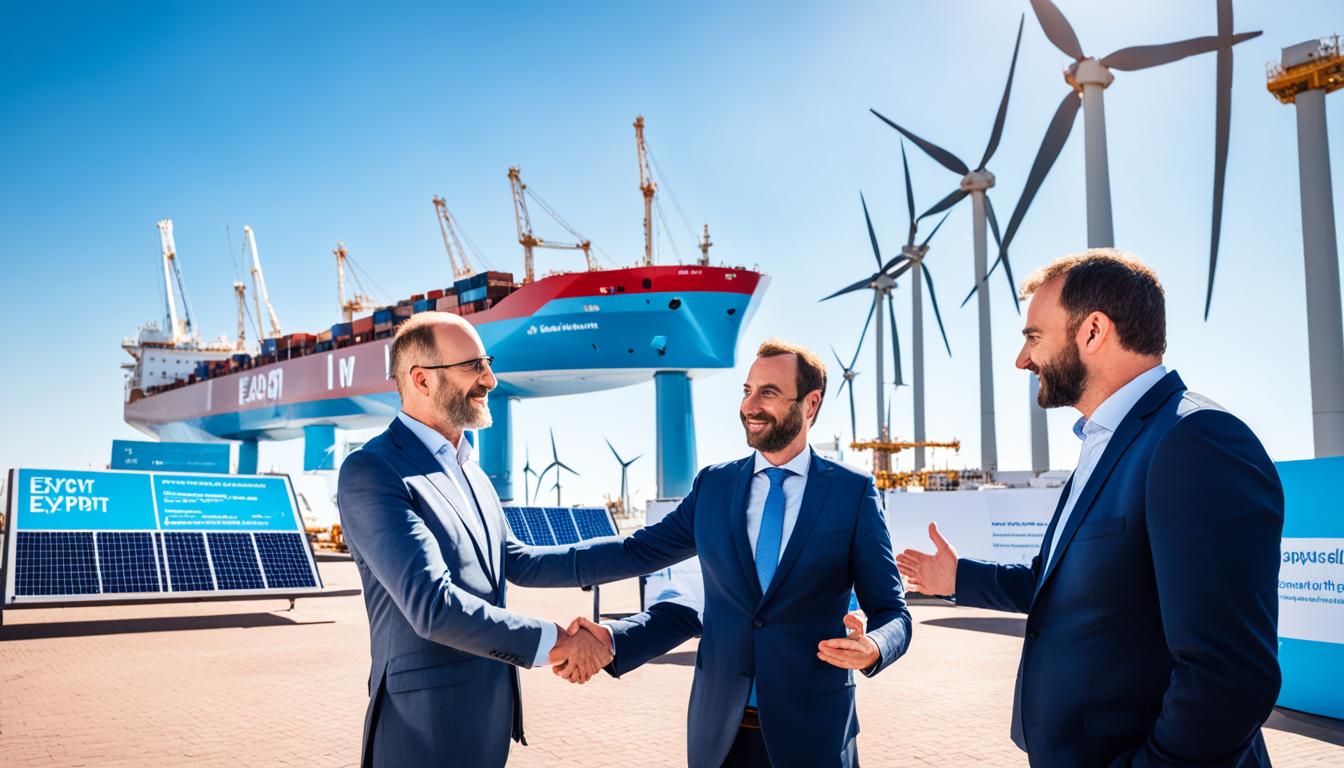Did you know that Masdar, in partnership with Infinity Power Holding and Hassan Allam Utilities, has recently signed a groundbreaking framework agreement for the development of a 2 GW green hydrogen project in the Suez Canal Economic Zone? In an ambitious move, the consortium aims to expand its capacity to 4 GW by 2030 and produce an astonishing 480,000 tons of green hydrogen per year, making it a major player in the global green fuel market. This significant deal highlights the collaboration between the United Arab Emirates (UAES) Masdar and Egyptian state-backed organizations, demonstrating their shared commitment to clean energy and sustainable development.
Key Takeaways:
- Masdar, along with consortium partners Infinity Power Holding and Hassan Allam Utilities, has signed a framework agreement for the development of a 2 GW green hydrogen project in the Suez Canal Economic Zone.
- The consortium aims to reach a capacity of 4 GW by 2030 and produce up to 480,000 tons of green hydrogen per year.
- This groundbreaking deal reflects the UAES’ support for Egypt’s clean energy objectives and marks a significant step towards achieving sustainable growth and decarbonization.
- The development of green hydrogen production facilities in Egypt positions the country as a key player in the global green fuel market, with vast potential for exports.
- The collaboration between Masdar, Infinity Power Holding, and Hassan Allam Utilities, together with Egyptian state-backed organizations, showcases their commitment to driving Egypt’s transition towards a green economy.
Development of Green Hydrogen Production Plants in Egypt
The Masdar-led consortium has signed two Memorandums of Understanding with Egyptian entities for the development of green hydrogen production plants in Egypt. These plants, which will be strategically located in the Suez Canal Economic Zone and on the Mediterranean coast, are set to play a crucial role in Egypt’s transition towards a green economy.
The first plant will be established in the Suez Canal Economic Zone, taking advantage of the region’s proximity to established transport infrastructure and trade routes. This location will facilitate the export of green hydrogen to both regional and international markets. The second plant will be situated on the Mediterranean coast, tapping into the coastal region’s abundant solar and wind resources for green hydrogen production.
By targeting operational readiness by 2026, the consortium is aligned with Egypt’s ambitious clean energy goals. These green hydrogen production plants will contribute significantly to the consortium’s target of achieving 4 GW of electrolyzer capacity by 2030. This level of capacity will enable the production of 480,000 tons of green hydrogen per year.
“The development of green hydrogen production plants in Egypt represents a significant step towards a sustainable, low-carbon future. These plants will leverage Egypt’s favorable geographic position and rich solar and wind resources to produce clean energy, driving the country’s economic growth while reducing greenhouse gas emissions.” – [Insert Name], Project Lead at Masdar
The establishment of these plants not only showcases Egypt’s commitment to renewable energy but also positions the country as a key green hydrogen player in the region. With its abundance of solar and wind resources, Egypt has the potential to become a leading exporter of green hydrogen, meeting the growing global demand for clean energy.
The development of green hydrogen production plants in Egypt aligns with the consortium’s sustainable growth objectives and supports the country’s broader energy transition. These plants will not only contribute to reducing carbon emissions but also create employment opportunities and foster technological innovation in the green energy sector.
The Role of Solar and Wind Resources
One of the key advantages of establishing green hydrogen production plants in Egypt is the country’s abundant solar and wind resources. These natural assets provide a reliable and renewable source of energy for electrolysis, the process of converting water into hydrogen and oxygen.
Egypt’s strategic geographical location ensures a high solar irradiance and strong wind speeds, making it an ideal location for renewable energy generation. The consortium’s decision to leverage these resources for green hydrogen production reflects their commitment to maximizing sustainability and reducing dependency on fossil fuels.
With the development of green hydrogen production plants in Egypt, the consortium aims to harness these solar and wind resources to generate clean and cost-effective energy. This will not only contribute to Egypt’s energy diversification but also support the growth of the green hydrogen market on a global scale.
To visualize the favorable solar and wind conditions in Egypt, refer to the data presented in the table below:
| Parameter | Value |
|---|---|
| Solar Irradiance | 6 kWh/m²/day |
| Wind Speed | 8 m/s |
Image:
The table and image above provide a comprehensive overview and visual representation of Egypt’s favorable solar irradiance and wind speed conditions, emphasizing the country’s potential for green hydrogen production.
Collaboration with Egyptian State-Backed Organizations
The consortium, consisting of Masdar, Infinity Power Holding, and Hassan Allam Utilities, has entered into a binding framework agreement with the Egyptian New and Renewable Energy Authority, the Egyptian Electricity Transmission Company, the Sovereign Fund of Egypt, and the Suez Canal Economic Zone. This agreement establishes the key terms and conditions for the green hydrogen development program, with a focus on the first phase of the project. It highlights the collaborative efforts between the consortium and the Egyptian government to promote sustainable development and achieve Egypt’s clean energy targets.
The collaboration between these Egyptian state-backed organizations and the consortium marks a significant milestone in advancing the green hydrogen sector in Egypt. By joining forces, they are leveraging their respective expertise and resources to drive the development of green hydrogen technologies and infrastructure. The involvement of the Egyptian government demonstrates its commitment to fostering an environment conducive to clean energy investments and achieving a sustainable future.
“The collaboration with these esteemed Egyptian state-backed organizations will enable us to combine our strengths and capabilities to accelerate the deployment of green hydrogen solutions in Egypt and contribute to the country’s clean energy transition,” said [Name], [Title] at Masdar.
The collective aim of this collaboration is to establish Egypt as a regional leader in green hydrogen production and contribute to the global efforts to combat climate change. By capitalizing on Egypt’s vast renewable energy potential, these organizations seek to create a robust green energy ecosystem that can meet domestic energy needs and supply green hydrogen to international markets.
This collaboration also sets an example for other countries and organizations looking to develop their own green hydrogen initiatives. The knowledge sharing and technical expertise gained from this partnership can serve as a blueprint for future collaborations and inspire similar efforts worldwide. Through these collaborative endeavors, the pathway to a sustainable and carbon-neutral future becomes more achievable.
Together, these Egyptian state-backed organizations and the consortium are laying the foundation for a prosperous green hydrogen sector that will contribute to economic growth, job creation, and environmental sustainability in Egypt and beyond.
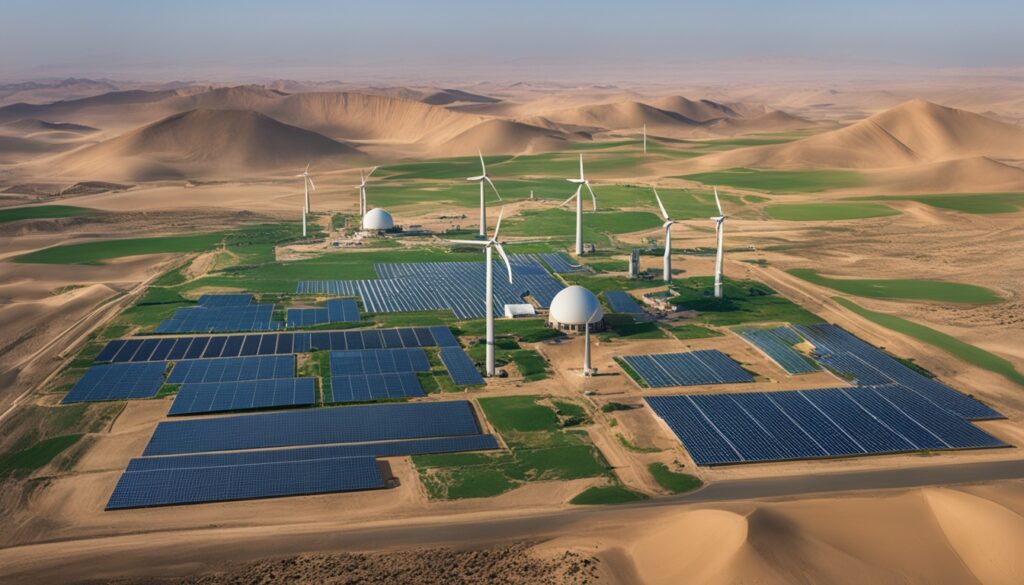
Green Hydrogen Manufacturing Facility in the Suez Canal Economic Zone
The first phase of the project will involve the establishment of a green hydrogen manufacturing facility in the Suez Canal Economic Zone, scheduled to begin operations by 2026. The facility will play a crucial role in the production of green hydrogen and green ammonia for both local industries and international exports. By leveraging Egypt’s abundant solar and wind resources, the facility aims to support Egypt’s sustainable energy transition and capitalize on the global demand for green hydrogen.
Located in the Suez Canal Economic Zone, the green hydrogen manufacturing facility benefits from its strategic position as a major trade route, connecting Africa, Asia, and Europe. This proximity to global markets positions Egypt as an ideal hub for green hydrogen production and export.
The facility’s electrolyzer capacity will be expanded in collaboration with the nearby Mediterranean coast, enabling a total capacity of 4 GW by 2030. With this expansion, the facility aims to produce 2.3 million tons of green ammonia for export and meet the growing demand for green hydrogen from various sectors, including transportation, industry, and power generation.
Potential Market Expansion and Economic Benefits
“The development of a green hydrogen manufacturing facility in the Suez Canal Economic Zone not only strengthens Egypt’s clean energy capabilities but also positions the country to become a major player in the global green hydrogen market.” – Sustainable Energy Analysts
In addition to meeting domestic demand, the facility’s location within the Suez Canal Economic Zone provides a strategic advantage for export purposes. The Suez Canal serves as a vital shipping route for international trade, connecting major global markets. Utilizing this advantageous position, Egypt can tap into the increasing global demand for green hydrogen and contribute to the decarbonization efforts of neighboring countries, particularly in Europe.
The export potential of the facility opens up opportunities for economic growth and job creation. By supplying green hydrogen to international markets, Egypt can foster new partnerships and investment opportunities, fostering a sustainable and thriving green economy in the region. Furthermore, the manufacturing facility will generate employment opportunities, both directly and indirectly, benefiting local communities and contributing to Egypt’s socioeconomic development.
Environmentally Friendly Production and Sustainability
The green hydrogen manufacturing facility in the Suez Canal Economic Zone aligns with Egypt’s commitment to sustainable development and its efforts to reduce carbon emissions. By utilizing renewable energy sources, such as solar and wind power, the facility significantly reduces its carbon footprint compared to conventional hydrogen production methods.
This sustainable approach to green hydrogen production promotes the use of clean energy and helps mitigate the environmental impact associated with carbon-intensive industries. The facility’s operations contribute to Egypt’s renewable energy targets, positioning the country as a leader in the global transition to a low-carbon economy.
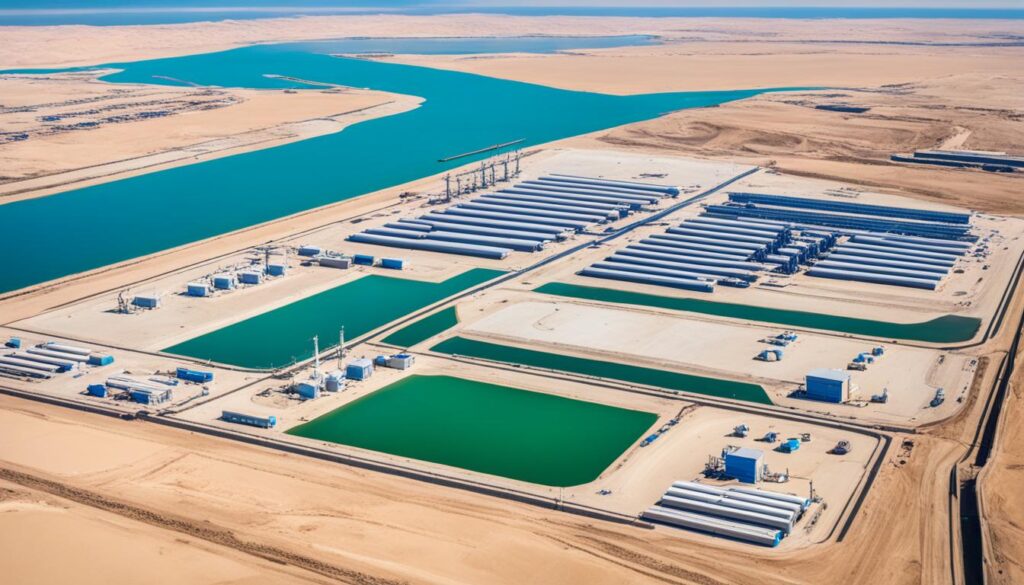
Capturing the Potential of the Suez Canal Economic Zone
With its strategic location and commitment to renewable energy, the Suez Canal Economic Zone has immense potential to drive economic growth and attract investments in the green hydrogen sector. The development of a green hydrogen manufacturing facility within this zone further amplifies its significance as a catalyst for both regional and global sustainability goals.
Through innovative technologies and strategic partnerships, the facility in the Suez Canal Economic Zone will contribute to Egypt’s position as a leading green hydrogen producer, exporter, and advocate for sustainable development.
Egypt’s Role as a Green Hydrogen Hub
Egypt, with its strategic geographical location and abundant solar and wind resources, is well-positioned to become a prominent green hydrogen hub. The development of green hydrogen production plants in Egypt, spearheaded by the Masdar-led consortium, aims to establish the country as a global leader in green fuel production while contributing to the growing market for green hydrogen worldwide.
The strategic location of Egypt, bridging continents and serving as a gateway between Africa, the Middle East, and Europe, provides a unique advantage for exporting green hydrogen. As Egypt strives to achieve its goal of 42% renewable energy in its energy mix by 2035, the export of green hydrogen to markets with increasing demand, particularly in Europe, offers a significant opportunity for economic growth and energy transition.
By creating green hydrogen production plants within its borders, Egypt can tap into its vast solar and wind resources, utilizing them to produce clean and sustainable energy. This not only supports the country’s clean energy goals but also reinforces its commitment to mitigating climate change and reducing carbon emissions, aligning with global efforts for a greener future.
Export Potential of Egyptian Green Hydrogen
The establishment of green hydrogen production plants in Egypt unlocks enormous export potential. With the increasing demand for clean energy solutions, particularly green hydrogen, Egypt’s strategic location can serve as a bridge connecting green hydrogen producers to consumers in international markets. The reliable and continuous production of green hydrogen from Egypt can meet the growing needs of industries seeking to decarbonize their operations.
Europe, in particular, presents a vital market for Egyptian green hydrogen exports. As European countries strive to reduce their carbon footprints and transition to renewable energy sources, the demand for green hydrogen as a clean fuel and feedstock for various sectors, including transportation, industry, and power generation, continues to rise. Egypt’s proximity to European markets, combined with its abundant renewable energy resources, positions the country as an attractive supplier of green hydrogen to meet this increasing demand.
Furthermore, the establishment of long-term partnerships and trade agreements can further strengthen Egypt’s position as a reliable exporter of green hydrogen. Collaborations with countries that rely on green hydrogen imports, as well as international organizations supporting clean energy transitions, can facilitate market access and ensure the sustainable growth of Egypt’s green hydrogen sector.
| Benefits of Egypt as a Green Hydrogen Hub | Export Potential |
|---|---|
| Strategic geographical location | Access to European markets and other global regions |
| Abundant solar and wind resources | Increase green hydrogen exports to meet growing demand |
| Supports Egypt’s clean energy objectives | Strengthen trade agreements and partnerships |
| Contributes to global efforts for a greener future | Facilitate market access and sustainable growth |
Egypt’s role as a green hydrogen hub not only enhances its own energy transition and sustainable development but also contributes to the global shift towards cleaner, more sustainable energy sources. By harnessing its renewable resources and establishing a strong green hydrogen industry, Egypt can play a pivotal role in decarbonizing various sectors, stimulating economic growth, and paving the way for a greener and more sustainable future.
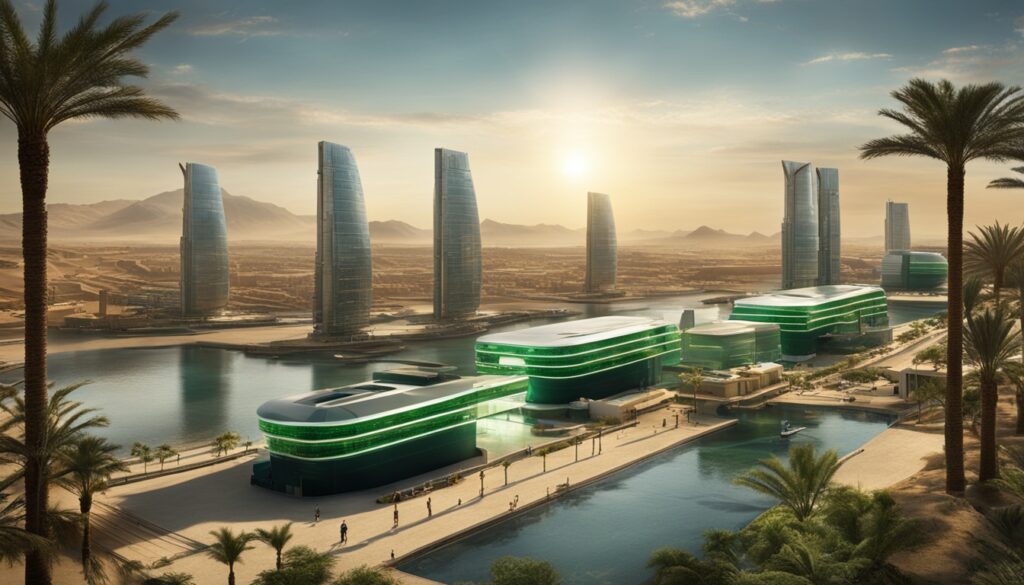
Strategic Partnerships for Decarbonization and Sustainable Growth
The collaboration between Masdar, Hassan Allam Utilities, and Infinity Power Holding, along with their strategic partnerships with Egyptian state-backed organizations, showcases their commitment to supporting Egypt’s transition towards a green economy and achieving its decarbonization objectives. These partnerships play a crucial role in the development of green hydrogen production facilities in Egypt, leveraging the country’s abundant natural resources for sustainable growth.
One notable partnership is with the Egyptian New and Renewable Energy Authority, the Egyptian Electricity Transmission Company, the Sovereign Fund of Egypt, and the Suez Canal Economic Zone. By joining forces with these organizations, Masdar and its consortium partners can effectively navigate the regulatory landscape, access funding opportunities, and collaborate with key stakeholders to expedite the implementation of their green hydrogen initiatives.
Another significant partnership in the consortium’s journey towards decarbonization is with Infinity Power Holding. This collaboration encompasses the establishment of 10 GW wind projects in Egypt, complementing the development of green hydrogen production facilities. By integrating wind energy generation with green hydrogen production, the consortium solidifies its commitment to sustainable growth and reduces carbon emissions, further contributing to Egypt’s clean energy objectives.
The strategic partnerships formed by this consortium exemplify a concerted effort to combine expertise, resources, and influence in order to accelerate the decarbonization process and achieve sustainable growth in Egypt. These collaborations facilitate knowledge sharing, technology transfer, and the mobilization of capital to harness the potential of renewable energy sources and promote the production and utilization of green hydrogen. By working together, Masdar, Hassan Allam Utilities, and Infinity Power Holding are pioneering a sustainable future for Egypt and inspiring similar initiatives worldwide.
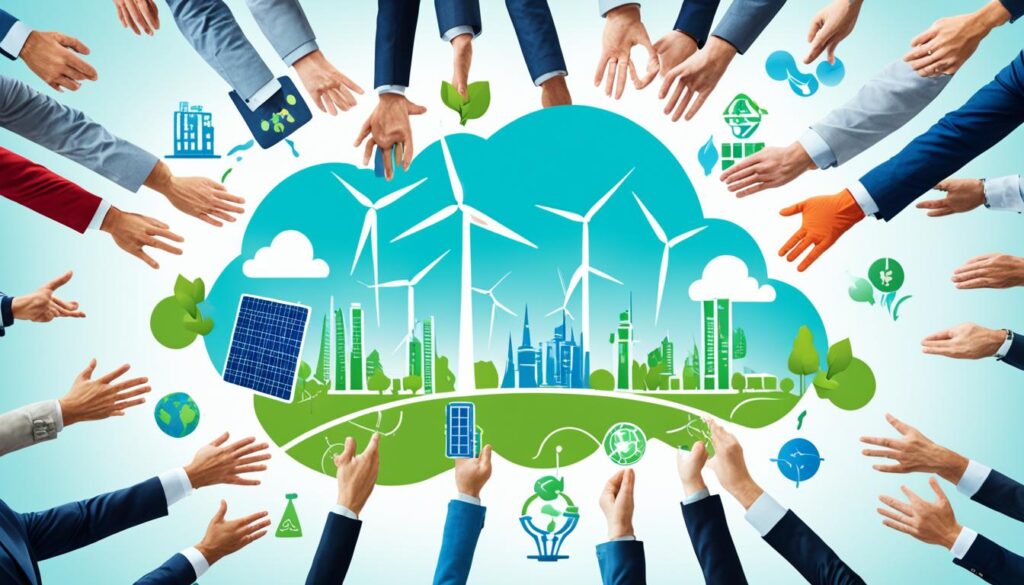
Key Strategic Partnerships for Decarbonization and Sustainable Growth
| Partnerships | Benefits |
|---|---|
| Egyptian New and Renewable Energy Authority | – Regulatory support for green hydrogen projects – Access to funding opportunities – Collaboration with key stakeholders |
| Egyptian Electricity Transmission Company | – Development of grid infrastructure to accommodate green hydrogen production – Integration of renewable energy sources |
| Sovereign Fund of Egypt | – Financial backing for green hydrogen initiatives – Promotion of sustainable investments |
| Suez Canal Economic Zone | – Strategic location for green hydrogen production and export – Development of a thriving green hydrogen hub |
| Infinity Power Holding | – Establishment of 10 GW wind projects in Egypt – Integration of wind energy with green hydrogen production |
Global Impact of Green Hydrogen Production
The development of green hydrogen production plants in Egypt has a significant global impact as it paves the way for the wider adoption of green hydrogen as a clean and sustainable energy source. With its abundant solar and wind resources, Egypt, along with other African countries, has the potential to capture a substantial share of the global green hydrogen market. This development not only holds the promise of a greener future but also presents unique opportunities for economic growth on the African continent.
The growth of the green hydrogen sector in Africa has the potential to create millions of jobs and contribute billions of dollars to the continent’s GDP. The establishment of green hydrogen production plants in Egypt can serve as a catalyst for economic development, driving innovation and fostering sustainable growth in the region. This sector has the capacity to bring about positive change by providing access to reliable and clean energy sources, especially for communities that have traditionally been underserved in terms of energy access.
In addition to its economic benefits, green hydrogen production plays a crucial role in decarbonization efforts across various industries. The aviation, steelmaking, and shipping sectors, among others, can leverage green hydrogen as an alternative to fossil fuels, reducing their carbon emissions and contributing to global efforts to combat climate change. Green hydrogen not only provides a sustainable energy source but also offers the potential for energy storage, addressing the intermittent nature of renewable energy sources like solar and wind power.
“The establishment of green hydrogen production plants in Egypt has the potential to transform the energy landscape, providing a roadmap for other nations to follow in their quest for a greener future.” – Renewable Energy Analyst
The global impact of green hydrogen production extends beyond Egypt’s borders. As countries worldwide strive to meet their renewable energy targets, the availability of green hydrogen can accelerate the transition to a low-carbon economy. By establishing itself as a leader in green fuel production, Egypt can contribute to international efforts to promote sustainability and reduce greenhouse gas emissions.
To further illustrate the impact of green hydrogen production, the table below highlights key regions and their projected use of green hydrogen in various industries:
| Region | Industry | Projected Use of Green Hydrogen (by 2030) |
|---|---|---|
| Europe | Aviation | 30% |
| Asia-Pacific | Steelmaking | 25% |
| North America | Shipping | 15% |
| Africa | Industrial Applications | 20% |
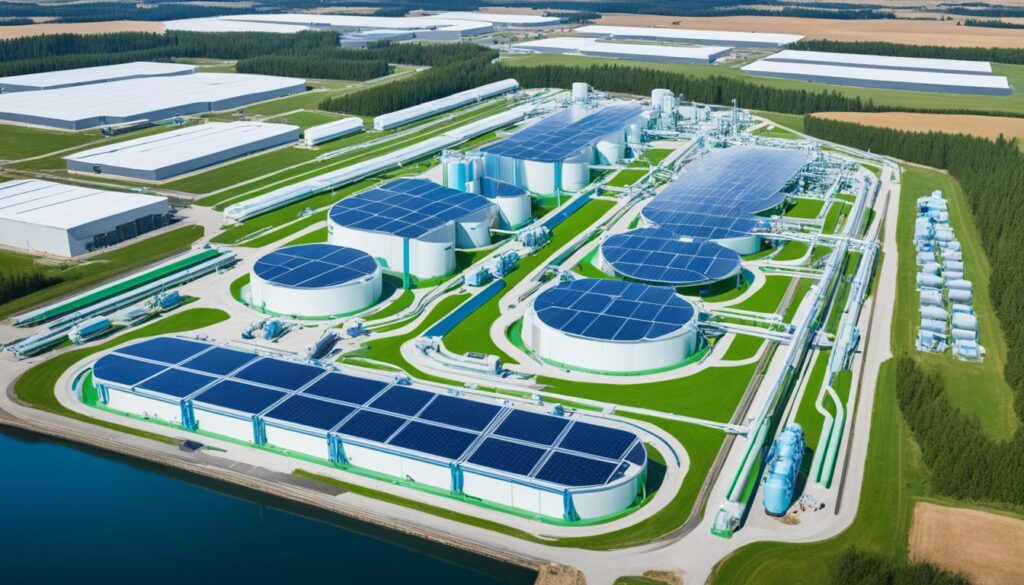
This representation shows the potential widespread adoption of green hydrogen as an alternative energy source across different regions and industries. As Egypt emerges as a key player in green hydrogen production, it can establish strategic partnerships and facilitate the export of green hydrogen to meet the growing demands of these industries worldwide.
The global impact of green hydrogen production goes beyond environmental considerations; it represents an opportunity for collaboration and shared economic prosperity. By embracing green hydrogen, nations can join forces in shaping a sustainable and resilient future, ushering in an era of clean energy that benefits both current and future generations.
Conclusion
The partnership between UAES Masdar, Hassan Allam Utilities, and Infinity Power Holding, in collaboration with Egyptian state-backed organizations, marks a significant step towards the development of a thriving green hydrogen sector in Egypt.
The targeted capacity of 4 GW by 2030 and the production of up to 480,000 tons of green hydrogen per year demonstrate the consortium’s commitment to sustainable growth and decarbonization. The establishment of green hydrogen production facilities in Egypt positions the country as a leader in green fuel production and opens opportunities for export to markets with high demand for green hydrogen.
This collaboration also contributes to Egypt’s clean energy objectives and supports the broader global transition towards a renewable, low-carbon future. By harnessing Egypt’s abundant solar and wind resources, UAES Masdar and its partners are paving the way for a greener and more sustainable energy landscape.
FAQ
What is Masdar’s role in the development of green hydrogen in Egypt?
Where will the green hydrogen production plants be located in Egypt?
Who are the consortium partners collaborating with in Egypt?
Where will the first green hydrogen manufacturing facility be located?
What is Egypt’s potential as a green hydrogen hub?
How do the partnerships with Egyptian state-backed organizations contribute to decarbonization and sustainable growth?
What is the global impact of green hydrogen production in Egypt?
Source Links
- https://www.prnewswire.com/ae/news-releases/masdar-led-consortium-strengthens-partnership-to-advance-landmark-4-gw-green-hydrogen-program-in-egypt-301680403.html
- https://www.cnbc.com/2022/04/26/masdar-signs-deal-for-major-green-hydrogen-projects-in-egypt.html
- https://masdar.ae/en/news/newsroom/masdar-signs-agreement-to-explore-exporting-green-hydrogen
